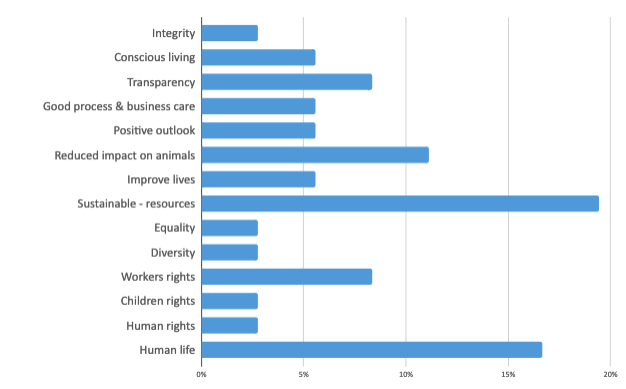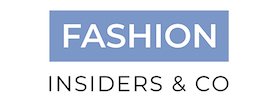The terms “ethical (fashion) manufacturing” and “sustainability” have become the buzz words of our generation. But are they just a marketing gimmick or do brands and customers really care about the issues?
One of the many great things about the internet era we live in is access to information. Everything and anything, 24/7. It is this unparalleled information sharing that has highlighted and proven to us all, that how we live and the actions we chose to take on a daily basis impact our planet.
Or rather threaten it.
Our increased consciousness has given rise to concerns about our ways of life, which in turn lead to scrutinising our habits.
One of the biggest threats to our planet is our obsession with shopping and mindless (over)consumption.
“I first came to ethical living through fashion, after travelling in Cambodia and reflecting on my fast fashion addiction and deciding to break the cycle. Nobody should suffer just because I want cheap clothes!” said Sian Conway from Ethical Hour “For me, ethical is about reducing any negative impact your actions may have on people, environment and animals – and trying to maximise the positive impact wherever you can. When it comes to business it’s about having a triple bottom line – ‘people, planet, profit’ and when it comes to lifestyle, it’s making sure that your actions empower others to thrive.”
“I would agree with Sian” said Hannah Wells , an ethical pattern designer, who we spoke to recently in our community. “My definition of ethical encompasses effects on humans, animals and the environment. My journey started because I had health problems and I also worked as a stressed out designer in the fashion industry, hating what I was seeing and contributing towards. Everything just came to a head and I knew I had to change my lifestyle. I looked into natural ways to treat my health and just opened a whole can of worms, which seems to be a bottomless can of worms. I wouldn’t have it any other way though!
Is “Ethical” just a buzz word?
But the terms ethical manufacturing” and “sustainability” have also become buzz words for our generation.
Are they just a marketing gimmick or do brands and customers really care about the issues?
As much as I care about manufacturing and subconsciously assess factories I visit and work with, based on my own in-built set of criteria, whenever I am asked if a factory is ethical – I find myself struggling to articulate an intelligent response. What do they mean by ‘ethical”? Is my understanding of “ethical fashion manufacturing” the same as yours and the next person’s?
Speaking to many brand owners and fashion entrepreneurs has helped confirm and clarify better (to myself) what “ethical fashion manufacturing” stands for in the minds of fashion insiders.
So what is Ethical Fashion Manufacturing?
In simple terms, the notion of Ethical fashion manufacturing concerns itself with the holistic approach to the manufacturing process, which focuses on good health for all involved.
As we have become exposed and even affected by the effects of global warming and become more educated on the causes, large parts of the world population have decided not to sit passively and accept the situation, but do something about it.
This activism has resulted in increased consciousness about what we buy and how we consume fashion, which in turn has pushed companies to become more responsible.
Ethical behaviour and corporate social responsibility can bring significant benefits to a business.
Businesses which care about their customers and their preoccupations have had to uplevel and examine every part, every facet of their company, including the processes employed by the 3rd parties they work with. The manufacturing supply chain, being a large part of the fashion industry has come under close watch. Brands can no longer claim to care and be ethical and not be responsible for the choices they make about who they work with.
The term “Ethical Fashion” is an umbrella term to describes a multitude of industry-wide components such as fashion design, production, retail, and purchasing. It covers a range of issues such as working conditions, exploitation, fair trade, sustainable production, the environment, and animal welfare.
Ethical Fashion and the Fashion Industry
The topic of Ethic and Manufacturing are large and a lot can be said about it. But to begin with, we asked people in our fashion industry community what ‘Ethical Manufacturing’ means to them.
The most common replies were:

No surprises in the list but what was heartwarming was to hear how small brands and entrepreneurs in their own way are living and practising the values they believe in. In a fashion world where we are used to hear how big brands “plan” to implement change by compiling extensive reports and a multitude of pages of Social Responsibility Documents, small brands are taking small actions daily.
The Only Way is…
While big brands have the most power and impact, it is the small brands and fashion entrepreneurs who lead the way by being innovative, inspirational and creative in how they apply what they believe in.
Up-cycling
“I came across the idea of ethical living thanks to my fashion buying habits. I have been a victim of fast fashion, always feeling the need to buy more to dress well. However, one workshop I attended on up-cycling made me realise how easy it was to create new garments out of old. The only thing necessary is a conscious shift in our mindset to buy less and buy from brands and designers who stand for values that I second” Akanksha Kaila told us when we spoke to her. “Ethical, for me, means making better choices. It means moving away from over-consumption to conscious consumption and conscious living where we are aware of the fact that our choices affect other lives”.
Transparency
“Ethical is a lifestyle every human being should practice! It has to start at home, and with the same respect and value one is living has to then incorporate it towards work. Ethical=Respect, everyone should have for other humans, animal, planet.” Marta Cernovskaja from the ethical brand Lemuel MC told us. She shared how she applies her believes not only at home but at the workplace: “I have an in-house seamstress she is also my pattern cutter, as I believe it’s the best way to ensure fairness and the quality of products. We also offer a bespoke and alteration service for an extra charge. That money goes directly to our seamstress as an appreciation for her amazing work! She has been with us from a beginning and we have the best relationship!
We also buy all our linen directly from Lithuanian factory which we visit all the time and can see how it is made and the conditions which we are very happy with. I believe working directly with people who make your clothing is the key. Working hand in hand is the key to mutual understanding and respect! Transparency for all involved is very important too.”
On a similar note, Claire Louise Couchman from Couchman Bespoke shared with us that “I only use individual tailors so that I can build up my own studio with them one day. This way I know where the money I pay is going. To be ethical is to have respect for all. To pay fairly to all who put a hand in the process, to source materials well; that a sustainable ecosystem is maintained; to be transparent about your production cycle; ‘who made my XXX (fill the blank)’ in relation to anything; to be conscious about the environmental impact of everything in life (not so it hinders your life enjoyment); to be aware so much so to be able to make the best choice.”
Positive Values
“For me, ethical is about positive values. We all have slightly different key values – veganism, organics, environment, fair trade but a combination of some or all of these. It’s a bit like the joy you get from giving, you feel better because you know you are doing the right thing.” said Jo Salter, the founder behind the ethical brand “Where Does It Come From”
You are what you believe.
It is no longer enough to just recite your values. Believing, taking actions based on these beliefs and finding like-minded people who share your values and concerns is what creates change.
According to studies made in the USA, 86 percent of millennials consider it a main priority to work for a business that conducts itself ethically and responsibly. In fact, most millennials would be willing to take a considerable pay cut to work for such a business.
The Bottom Line
The issue of ethical fashion manufacturing matters more today than they did a few decades ago. While some brands may apply the term loosely as part of their marketing campaigns, today’s consumer is savvy and well informed. They want to see it, to believe it. Activist consumers are also loyal, therefore success in these circles equates to the daily practising of what one preaches.
Malpractices no longer can be ignored and bad news travels fast. Being ethical is no longer a “nice to have” facet to a fashion business, but instead a “must aspire to” for every small or large brand.
Because ultimately, the future is what we make it and fashion as being the second largest polluting global industry, has a lot to answer for and much to contribute to the betterment of the planet and its people.




